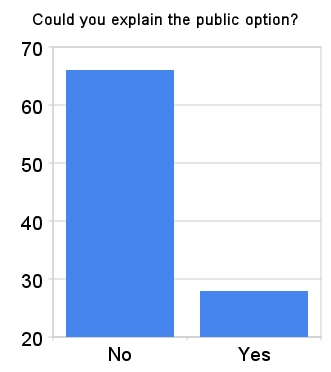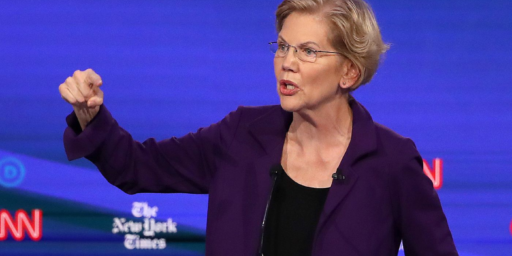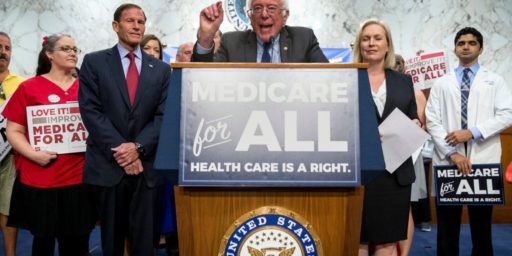Public Opinion on the Public Option
 Ezra Klein passes on word that the public doesn’t understand the public option. Or, more specifically, when asked, “Could you confidently explain what exactly the public option is to someone who didn’t know?” 66% answered no; the others lied or were in error.
Ezra Klein passes on word that the public doesn’t understand the public option. Or, more specifically, when asked, “Could you confidently explain what exactly the public option is to someone who didn’t know?” 66% answered no; the others lied or were in error.
Matt Yglesias is bemused by this because, after all, this has been written and talked about a whole lot. Helpfully, he explains that,
[T]he bills would create health insurance exchanges that would facilitate the purchase of health insurance on an individual market for people who don’t get insurance through their employers or Medicare or Medicaid. Part of how this works is that everyone who doesn’t get insurance through their employers or Medicare or Medicaid is going to be required to sign up for an exchange plan. Families will also be given subsidies to help them afford insurance. Presumably this large pool of potential customers is going to make insurance companies want to offer plans that meet the criteria for inclusion on the exchange. The “public option” proposal is the idea that in addition to whatever private industry wants to offer, the government ought to create a plan that consumers on the exchange can sign up for. As currently constituted, the public option doesn’t get any extra money from taxpayers beyond the premiums it takes in, and has no special links with Medicare, Medicaid, the VA health care system, or any other existing public sector program.
Which demonstrates simultaneously that Matt understands what the public option is but that, no, he could not explain it to someone who didn’t know.
I’d explain it simply as “the Federal Government would get into the business of selling health insurance.” That’s simpler and easier to understand but leaves out some important nuances. But bringing those in makes the idea too complicated for most people to intuitively grasp.






“the Federal Government would get into the business of selling health insurance”
Which will either
(a) destroy the private health insurance market or
(b) give rise to a single payer system.
(a) = conservative view
(b) = liberal view
Ah James, “a commenter” might ask if you could list the ways the Federal Government is already offering health insurance.
I don’t think Medicare is truly insurance, since everyone’s required to get it and payment isn’t based on risk pooling. It’s basically socialized medicine for the elderly.
Maybe Tricare, the program for active and retired military, counts? It has come into being since my association with the military, so I’m not quite sure how it works.
I would count Medicare, and the probably hundreds of flavors of insurance for federal employees.
There is also apparently a thing called the Federal Medical Assistance Percentages. Quite a few things get pulled in there, as jointly funded by states and the fed.
A simple voucher would streamline all that quite a bit.
John personna, I currently can’t buy any of the health insurance offered by the government. I don’t think it’s a terrible oversimplification to say that the public option would mean the government would sell insurance (to the public).
Is “buy” versus “offer” really a significant distinction? I know you guys wouldn’t go for a semantic argument 😉
I’m not making a semantic argument. I am not currently offered any government insurance either.
I don’t think Medicare is truly insurance, since everyone’s required to get it and payment isn’t based on risk pooling. It’s basically socialized medicine for the elderly.
Maybe Tricare, the program for active and retired military, counts? It has come into being since my association with the military, so I’m not quite sure how it works.
Tricare is simply an HMO for the military. It is not government healthcare but 4 private insurance companies which won the bids to cover the military. Humana is the one that supplies Tricare to the military in the northern U.S.
In other words the “great healthcare” the military receives will be changing too if the government gets in the business of selling insurance.
Call it what you will, but it strikes me that the argument Ezra presents meshes rather nicely with the mantra of “The reason you don’t like the government health care takeover is you’re all too stupid to see it’s greatness”…. that being the standard argument used against ANY resistance….
Sure, though to be fair its the mantra every party ultimately uses for every policy that doesn’t get wide approval. That or saying its un-American to disagree (something both Parties are happy to accuse others of doing).
Both political parties take the position that their beliefs are definitive, and its the universe that’s sometimes in error (with apologies to Douglas Adams).
What I don´t understand is the idea that the so called Public Option would drop prices of the private insurance. The fact that something like half of the bank acccounts in Brazil are in state owned banks doesn´t make banks or interest rates cheaper.
Everyone who is employed is required to pay a Medicare tax, but everyone is not required to take Medicare.
Medicare is not health insurance in that it doesn’t screen for risk factors and pretty much pays any and all claims (supposedly save for fraudulent ones). As such calling it insurance is a bit misleading. Health care…subsidized health care, sure.
Lifted from MR today, the non-semantic argument: